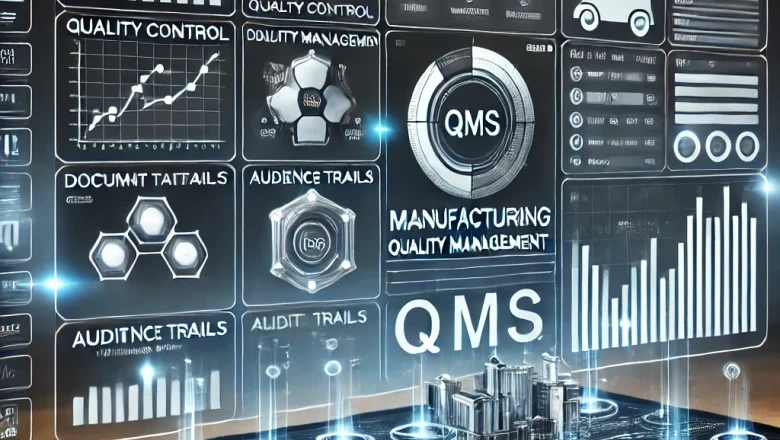views
Ensuring regulatory compliance in manufacturing is a critical concern for companies, particularly those in highly regulated sectors such as Life Sciences, Medical Devices, Pharma, Aerospace, and Automotive. A robust Manufacturing Quality Management System (QMS) framework is essential for organizations to navigate complex regulatory requirements while maintaining the highest quality standards in their products and operations. With increasing pressures from regulators and consumers, adopting an advanced QMS framework becomes essential for safeguarding business reputation, operational efficiency, and regulatory adherence.
The Need for Advanced Manufacturing Quality Management System in Highly Regulated Industries
Manufacturers in regulated industries, including Life Sciences, face stringent quality standards, making regulatory compliance a fundamental concern. The integration of an advanced manufacturing quality management system is crucial in ensuring that organizations meet industry-specific requirements. By leveraging QMS frameworks, companies can efficiently manage their quality assurance processes, enabling them to streamline compliance while improving overall operational performance.
Meeting Industry-Specific Regulatory Standards
In highly regulated industries like medical devices and pharmaceuticals, manufacturing companies must comply with various quality standards such as ISO 13485 and Good Manufacturing Practices (GMP). An advanced manufacturing quality management system helps companies maintain these standards, reducing the risk of non-compliance and ensuring that products are manufactured in accordance with regulatory guidelines.
Navigating Complex Regulations in Aerospace and Automotive Manufacturing
Aerospace and automotive industries operate under tight regulatory scrutiny, with safety standards and quality requirements driving product development and manufacturing processes. A manufacturing quality management system that integrates quality control, documentation, and process validation helps companies ensure compliance with industry-specific standards, such as AS9100 for aerospace or IATF 16949 for automotive manufacturing.
The Role of eQMS in Ensuring Manufacturing Regulatory Compliance
Electronic Quality Management Systems (eQMS) are an evolution of traditional quality management systems, providing advanced features for managing compliance in manufacturing. An EQMS integrates technology and data analytics to facilitate real-time monitoring, reporting, and tracking of regulatory requirements, making it easier for companies to stay compliant with ever-changing standards and regulations.
Automating Compliance Tracking with eQMS Software
eQMS software offers automation capabilities that allow manufacturing companies to manage compliance-related tasks more efficiently. This includes automating processes like document control, auditing, and nonconformance management, ensuring that all regulatory requirements are met in real time. Automation reduces the risk of human error and enables companies to stay ahead of regulatory changes.
Enhancing Audit Readiness with eQMS Solutions
In regulated manufacturing sectors, audits are a regular part of the compliance process. eQMS solutions streamline audit preparation by maintaining an accurate, up-to-date repository of documents and records. This ensures that manufacturers are always ready for regulatory inspections and audits, reducing the potential for costly penalties or delays.
Enhancing Product Quality through Quality Control and QMS Software Integration
Manufacturing companies, particularly in sectors like medical devices and pharmaceuticals, must maintain the highest levels of product quality to meet regulatory requirements. Integrating Quality Control processes with manufacturing quality management systems enhances the ability to monitor, measure, and report on product quality consistently throughout the production process.
Aligning Quality Control Processes with Manufacturing Quality Management System
Quality control plays a significant role in ensuring that products meet customer and regulatory expectations. By integrating quality control processes directly into a manufacturing quality management system, companies can ensure that every stage of the production process is subject to rigorous quality checks. This alignment helps prevent product defects and ensures that regulatory standards are continuously met.
Leveraging Quality Management Software to Monitor and Improve Product Quality
Quality Management Software offers manufacturers a comprehensive suite of tools to track and manage quality across the entire lifecycle of a product. By utilizing QMS software, manufacturers can analyze real-time data on production processes, identify areas of improvement, and take corrective actions to prevent non-compliance. This results in improved product quality, reduced defects, and enhanced regulatory compliance.
Streamlining Document Control and Compliance Management in Manufacturing
Document control is a critical aspect of regulatory compliance in manufacturing. A well-designed manufacturing quality management system ensures that all documents are stored, tracked, and reviewed according to regulatory requirements, enabling manufacturers to maintain an organized and compliant operation.
Improving Document Traceability with Manufacturing Quality Management Systems
Manufacturers must ensure that critical documents, including design specifications, manufacturing procedures, and quality records, are well-organized and traceable. Manufacturing quality management systems provide a centralized platform to store and manage documents, ensuring that they are easy to access and review for compliance purposes.
Reducing Document Management Errors through eQMS Software
Managing documents manually is prone to errors, such as version control issues and misplaced records. eQMS software eliminates these risks by automating document control processes, ensuring that the correct versions of documents are always available, and that updates are tracked efficiently. This increases compliance and reduces administrative burden for quality teams.
Managing Nonconformance and Corrective Actions in Compliance
Nonconformance management and corrective actions are essential elements of any QMS framework. In manufacturing, nonconformance refers to situations where products or processes do not meet the required standards or specifications. Advanced manufacturing quality management systems help organizations track, investigate, and resolve nonconformances promptly, ensuring that corrective actions are taken to prevent future incidents.
Identifying Root Causes and Implementing Corrective Actions
Advanced QMS frameworks facilitate root cause analysis, enabling companies to identify the underlying causes of nonconformance. By systematically investigating nonconformance issues, manufacturers can implement effective corrective actions that prevent recurrence, improving overall compliance and product quality.
Streamlining CAPA Processes in Manufacturing with QMS Software
Corrective and preventive action (CAPA) is a core component of any manufacturing quality management system. QMS software provides tools to track and manage CAPA processes, ensuring that corrective actions are implemented quickly and effectively. This helps manufacturers address potential quality or compliance issues before they become significant problems, ensuring continuous improvement.
Leveraging Analytics for Continuous Compliance in Manufacturing
Advanced manufacturing quality management systems come equipped with powerful analytics tools that provide manufacturers with valuable insights into their processes. These tools enable manufacturers to continuously monitor compliance with industry standards and regulatory requirements, making it easier to identify areas for improvement.
Utilizing Data to Track Compliance Metrics in Real-Time
Manufacturers can leverage QMS software to track key compliance metrics in real-time. By monitoring these metrics continuously, companies can quickly identify compliance gaps and take corrective actions, ensuring that they stay on top of regulatory requirements and industry standards.
Predictive Analytics to Enhance Compliance Readiness
Predictive analytics integrated into advanced QMS systems help manufacturers anticipate potential compliance issues before they arise. By analyzing historical data, QMS software can identify trends and patterns that may indicate future non-compliance risks, allowing manufacturers to proactively address issues before they affect operations.
Why ComplianceQuest’s Software is Essential for Business in 2025
As regulatory requirements continue to evolve, businesses in the manufacturing sector need a robust system to manage compliance while maintaining operational efficiency. ComplianceQuest’s manufacturing quality management system provides manufacturers with a comprehensive platform that integrates quality control, document management, nonconformance tracking, and more. By utilizing ComplianceQuest’s software, manufacturers can streamline their operations, improve product quality, and ensure compliance with regulatory standards.
In 2025, businesses need software solutions that not only meet current compliance needs but also provide the flexibility to adapt to new regulatory changes. ComplianceQuest’s software offers advanced capabilities that enable manufacturers to stay ahead of evolving industry requirements, making it a crucial tool for success in today’s competitive and heavily regulated market.























Comments
0 comment